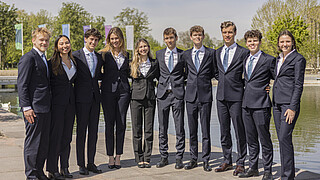Keynote speaker was Jan Peter Balkenende, former Prime Minister of the Netherlands, Partner Corporate Responsibility at EY and Professor Emeritus at Erasmus University. The discussion panel comprised Jean-Pierre Kempeneers, Chief Corporate Affairs of Nexperia, the publicly listed chipmaker; RSM Associate Professor Merieke Stevens; and Michel Kerres, Diplomatic Editor at media organisation NRC.
Prof. Balkenende said the EU economy needs to switch the drive for shareholder profits to a drive for sustainable profit that focuses on shared and societal value. To achieve this requires unity and a reconnection between companies, other countries, and customers to achieve a sustainable, inclusive and connecting economy. Europe is often seen as an example to the rest of the world.
The panel debate, moderated by Geert Maarse, brought interesting topics from outside of the mainstream into the discussion, and brought different perspectives from the panellists.
The audience heard that Europe has been shaken out of its complacency, first by the Covid-19 pandemic and then by war in Ukraine that showed the huge dependence on China and the US for supplies and support, and there was a discussion of the importance of European defence spending.
The importance of sustainability is not so apparent among the populations of the US and China but their participation is essential in making the planet sustainable. Financial incentives could help achieve sustainable production globally.
The discussion included the role of politics in the supply of computer chips – a very small but incredibly important component produced in huge quantities – and the ban on exporting high-tech European chips to China.
The discussion covered other topics in other sectors, for example if Europe followed China’s example of flexibility in patent laws to create stronger competition in a way that benefits consumers, and the need for creativity when looking for profitable sustainable production. Jean Pierre Kempeneers mentioned the subject of bad air quality in Beijing which makes citizens so dissatisfied that they have forced the government to address the issue. Now, more than half of all new cars sold in Beijing are electric, and many factories producing pollution have been closed. If a country like China can move fast and decisively on issues like this, then the importance of sustainability will permeate other countries eventually and there should be hope for the future in Europe.
The event was followed by a networking reception in the Paviljoen on campus at Erasmus University Rotterdam.
The event was livestreamed. A recording of the livestream can be watched here.




